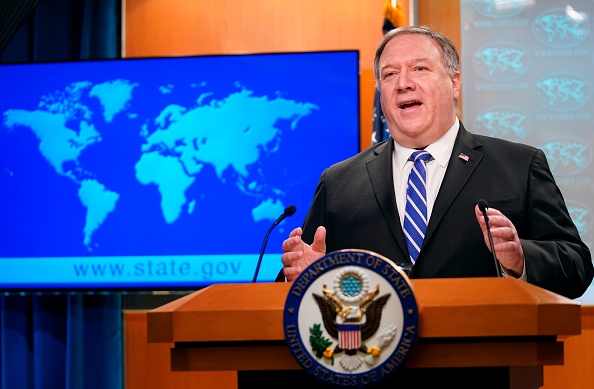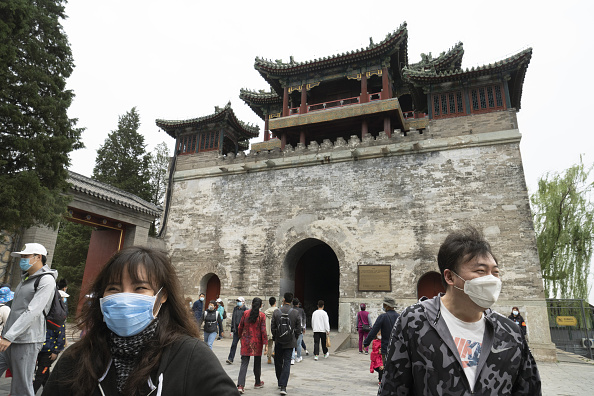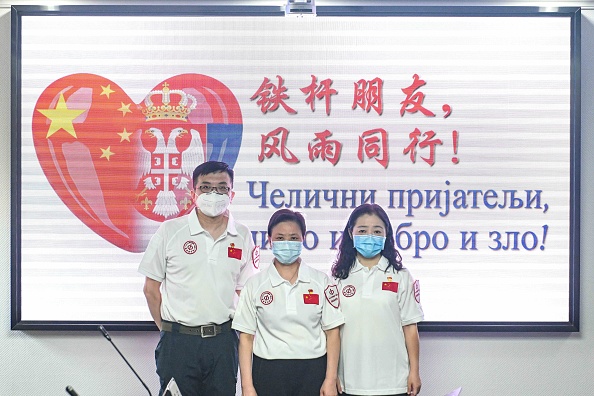
 Attacks and Counterattacks
Attacks and CounterattacksThe United States and China are exchanging heated rhetoric over the coronavirus pandemic, as President Trump's administration continues to sow accusations and conspiracy theories over the origin of COVID-19.
Secretary of State Mike Pompeo claimed that there is "enormous evidence" that the virus originated in a Wuhan laboratory, despite intelligence experts and international analysts saying the virus began at a wet market. Pompeo later backtracked, saying that the origins of the virus can't be certain. Chinese Foreign Ministry spokesperson Hua Chunying said that Pompeo could not present evidence because he didn't have any, and accused the U.S. of spreading false theories for political gain.
Deputy National Security Advisor Matt Pottinger, who worked as a journalist in China early in his career, delivered a speech in Mandarin Chinese seemingly aimed at the Chinese public, paying tribute to two "brave" Chinese doctors who raised early alarms about the coronavirus, and saying that China needs more populism, less nationalism.
Despite the building hostility, U.S. and Chinese trade negotiators will discuss progress in implementing the Phase One trade agreement. This will mark the first formal dialogue since the agreement was signed five months ago, just before the global pandemic upended global supply chains and threw economies into disarray.
With the United States' November elections looming, both the Republican and Democratic parties are eyeing China as an expedient target for attacks. The Biden campaign posits that Trump was not forceful enough in demanding transparency from Chinese leaders, while the Trump campaign accuses Vice President Biden of coddling China in a series of new attack ads. Columbia University Professor Jeffrey Sachs speaks on the tensions between China and the United States, and the need for global partnership, in his latest video interview with China-US Focus.
 A Toolkit for the Time
A Toolkit for the TimeThe Chinese Communist Party has long been cognizant that an economic slowdown might threaten the country's stability and has thus prepared an arsenal of tools to safeguard its economy. To cope with COVID-19, President Xi Jinping has launched a huge economic construction campaign, invested in poverty relief and advanced technology, and helped stabilize coronavirus-hit factories and consumer spending.
China's economy is meanwhile trying to recover from the COVID-19 impact - tourism during the Labor Day holiday dropped by 60% compared to 2019, and consumer spending was down not surprisingly. Chinese unemployment figures are notoriously opaque, as they don't account for rural communities or many of the 290 million migrant workers who work in construction, manufacturing, and other low paying jobs. Even so, the official unemployment rate has risen to 5.9%, reflecting that more than 27 million people are out of work.
While there are a decreasing number of coronavirus cases in China, a new Chinese study came out this week about "reactivated" cases, showing that between 5-15% of those infected with the coronavirus may have tested positive again, albeit without symptoms.
 Softening the Criticism
Softening the CriticismThe European Union is facing a public outcry after the EU's Ambassador to Beijing allowed China Daily to remove a reference to the coronavirus having originated in China. The EU delegation said it "strongly regrets" the change, but said that it allowed the censored piece to be published because it still contained "key messages on a number of our priority areas." This comes after EU officials softened certain areas of a report assessing China's misinformation spreading about the virus a few weeks ago. "We regret that this op-ed, that this joint op-ed was not published in full by the China Daily," the European Commission spokeswoman Virginie Battu-Henriksson commented on Thursday.
The EU also announced it would ramp up aid to the Balkan states this week, as Russia and China continued to send doctors and medical supplies to the region. The EU has so far provided 3.3 billion euros ($3.6 billion) to the region. 6 Balkan states are currently vying for EU membership, offering the EU an opportunity to hedge against China's growing influence in the region. China has been especially generous towards Serbia since the virus broke out, with the Serbian President praising China as being "great friends of Serbia and Serbs...I am waiting for Xi to visit Serbia and hundreds of thousands of people will welcome him."
Prepared by China-US Focus editorial teams in Hong Kong and New York, this weekly newsletter offers you snap shots of latest trends and developments emerging from China every week, while adding a dose of historical perspective.
- 2020-05-02 Retaliatory Actions
- 2020-04-24 Sinking Perceptions
- 2020-04-18 Pandemic World
- 2020-04-11 The Long Road Back to Normalcy
- 2020-04-03 Shifting Gears
- 2020-03-28 Cooperation or Confrontation
- 2020-03-20 World in Turmoil
- 2020-03-13 Global Emergency
- 2020-03-06 Global Strains
- 2020-02-28 Coronavirus Gone Global
- 2020-02-22 The Virus Continues
- 2020-02-15 Asserting Control
- 2020-02-08 A Novel Outbreak
- 2020-01-31 Global Health Emergency Declared
- 2020-01-24 Celebrations Grounded
- 2020-01-17 Signed, Sealed, Delivered
- 2020-01-10 Ink the Deal
- 2019-12-20 A Level Playing Field
- 2019-12-13 It’s a (Limited) Deal!